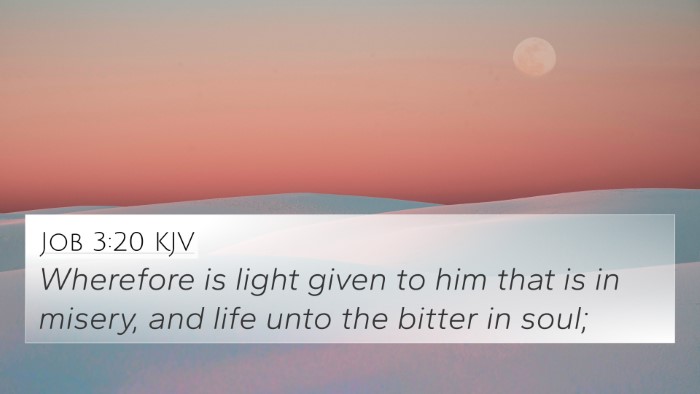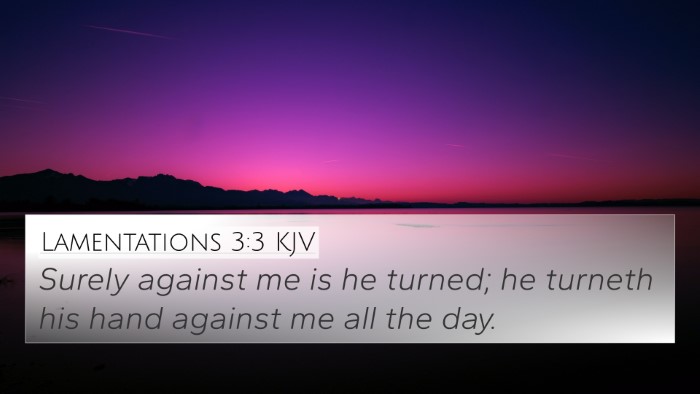Understanding Job 9:18
Job 9:18 states, "He will not suffer me to take my breath, but he will fill me with bitterness." This verse reflects Job's deep despair as he grapples with the overwhelming nature of his suffering and the perceived indifference of God towards his plight. Through the insights derived from various public domain commentaries, we can gain a fuller understanding of its implications.
Overview of Job 9:18
This verse comes from a larger discourse where Job discusses the nature of his afflictions, the justice of God, and his own inability to contend with divine scrutiny. Job expresses a poignant sense of helplessness, feeling that he is unable to escape the suffering imposed upon him.
Commentary Insights
-
Matthew Henry:
Henry notes that Job's expression indicates a struggle against despair, as he feels crushed under the weight of his suffering. He reflects on the futility of trying to argue his innocence before God, realizing that God’s ways are beyond human comprehension. Henry emphasizes Job’s sense of bitterness as he perceives God's heavy hand upon him, which leads to a profound contemplation of human vulnerability before divine omnipotence.
-
Albert Barnes:
Barnes elaborates on the idea that Job is acknowledging the relentless nature of his anguish, which seems unending. He interprets this verse as Job feeling as if he is being actively suffocated by his tribulations and bitterness, preventing him from finding solace or relief. This comment expands on the emotional aspect of Job's suffering, making clear that it was not merely physical but deeply psychological and spiritual.
-
Adam Clarke:
Clarke adds another layer by examining the cultural and linguistic nuances of the Hebrew text. He points out that the term "bitterness" suggests a deep-rooted sorrow that goes beyond temporary suffering, indicating profound discontent with the injustices Job perceives. Clarke elucidates that Job’s lament highlights the struggle between faith and despair, illustrating a tension that many believers face in their own lives when confronted with unexplainable suffering.
Connection to Other Scriptures
Understanding Job 9:18 can be enriched when viewed in relation to other Bible verses that echo similar themes of suffering, divine justice, and human frailty. Here are some notable cross-references:
- Psalms 38:4: "For mine iniquities are gone over my head: as a heavy burden they are too heavy for me." - This verse parallels Job’s feeling of being overwhelmed by his burdens.
- Psalms 10:1: "Why standest thou afar off, O Lord? Why hidest thou thyself in times of trouble?" - A reflection of Job’s desire for God's presence amidst suffering.
- Lamentations 3:19-20: "Remembering mine affliction and my misery, the wormwood and the gall." - These verses resonate with the bitterness Job expresses.
- Isaiah 53:3: "He is despised and rejected of men; a man of sorrows, and acquainted with grief." - This alludes to the theme of suffering conveyed by Job and foreshadows Christ's own suffering.
- Romans 8:18: "For I reckon that the sufferings of this present time are not worthy to be compared with the glory which shall be revealed in us." - A New Testament connection highlighting hope amid suffering.
- 2 Corinthians 12:9: "My grace is sufficient for thee: for my strength is made perfect in weakness." - A passage that offers insight into divine sufficiency amidst human weakness.
- Hebrews 12:11: "Now no chastening for the present seemeth to be joyous, but grievous: nevertheless afterward it yieldeth the peaceable fruit of righteousness." - This connects to the fruit borne out of suffering, giving hope to Job’s lament.
Thematic Connections and Applications
Job 9:18 invites profound thematic connections surrounding the concepts of human suffering and divine justice. By examining these themes, readers can engage in comparative Bible verse analysis, enhancing their understanding of the Bible's coherent narrative regarding suffering and redemption.
- Understanding Human Suffering:
Job’s cry resonates with many biblical characters and their complaints against suffering. The emphasis on personal pain can help believers feel less isolated in their struggles.
- The Nature of God’s Justice:
Like Job, many wrestle with the apparent absence of divine justice. Cross-referencing with other lamenting psalms allows for a fuller picture of this struggle.
- The Role of Faith Amidst Trials:
Understanding this verse within the larger context of faith highlights the tension between trusting God and confronting painful realities.
Conclusion
Job 9:18 encapsulates a poignant moment in the narrative of suffering. Through the insights of commentators like Matthew Henry, Albert Barnes, and Adam Clarke, along with significant cross-references, this verse becomes a gateway for understanding the complexities of biblical lament and the human experience of pain. By exploring these connections, believers can cultivate a more nuanced approach to recognizing and processing their own trials in light of Scripture.












